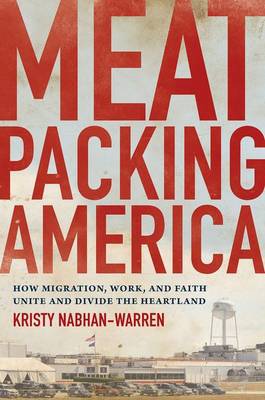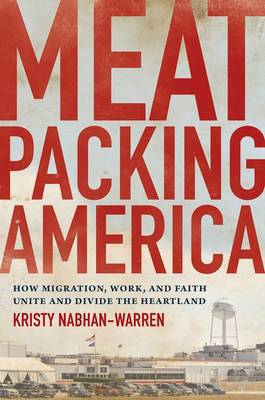
- Afhalen na 1 uur in een winkel met voorraad
- Gratis thuislevering in België vanaf € 30
- Ruim aanbod met 7 miljoen producten
- Afhalen na 1 uur in een winkel met voorraad
- Gratis thuislevering in België vanaf € 30
- Ruim aanbod met 7 miljoen producten
Meatpacking America
How Migration, Work, and Faith Unite and Divide the Heartland
Kristy Nabhan-WarrenOmschrijving
Whether valorized as the heartland or derided as flyover country, the Midwest became instantly notorious when COVID-19 infections skyrocketed among workers in meatpacking plants--and Americans feared for their meat supply. But the Midwest is not simply the place where animals are fed corn and then butchered. Native midwesterner Kristy Nabhan-Warren spent years interviewing Iowans who work in the meatpacking industry, both native-born residents and recent migrants from Latin America, Africa, and Asia. In Meatpacking America, she digs deep below the stereotype and reveals the grit and grace of a heartland that is a major global hub of migration and food production--and also, it turns out, of religion.
Across the flatlands, Protestants, Catholics, and Muslims share space every day as worshippers, employees, and employers. On the bloody floors of meatpacking plants, in bustling places of worship, and in modest family homes, longtime and newly arrived Iowans spoke to Nabhan-Warren about their passion for religious faith and desire to work hard for their families. Their stories expose how faith-based aspirations for mutual understanding blend uneasily with rampant economic exploitation and racial biases. Still, these new and old midwesterners say that a mutual language of faith and morals brings them together more than any of them would have ever expected.
Specificaties
Betrokkenen
- Auteur(s):
- Uitgeverij:
Inhoud
- Aantal bladzijden:
- 280
- Taal:
- Engels
Eigenschappen
- Productcode (EAN):
- 9781469663494
- Verschijningsdatum:
- 21/09/2021
- Uitvoering:
- Paperback
- Formaat:
- Trade paperback (VS)
- Afmetingen:
- 196 mm x 234 mm
- Gewicht:
- 362 g

Alleen bij Standaard Boekhandel
Beoordelingen
We publiceren alleen reviews die voldoen aan de voorwaarden voor reviews. Bekijk onze voorwaarden voor reviews.







